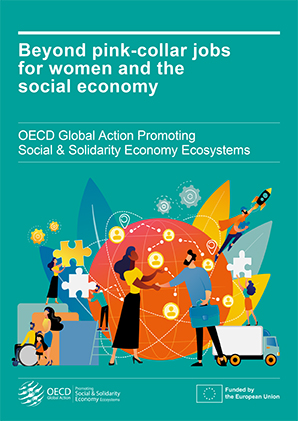Building on many data sources and country examples, the new OECD’s report analyses women’s employment in the social and solidarity economy (SSE), explores challenges to gender equality in the SSE)and provides policy recommendations to recognize women’s work and leadership in the SSE and in the wider economy. It also suggests ways to foster their participation in high-growth sectors within the SSE, such as technology-intensive and green sectors.
The social and solidarity economy provides jobs for women and can help promote gender equality more widely. Gender equality in the workplace remains a challenge despite considerable efforts over the years to address it. The Organisation for Economic Co-operation and Development (OECD) estimates that gender discrimination in formal and informal laws, social norms, and practices costs the global economy USD 12 trillion, 16% of global income (Ferrant and Kolev, 2016). Reducing discrimination could lead to an annual average increase in global gross domestic product (GDP) of 0.3 to 0.6 percentage points by 2030 (Ferrant and Kolev, 2016).
As a vehicle for creating jobs with impact, the social and solidarity economy (SSE) can also play a major role in achieving gender equality. Based on estimates, the SSE is already providing up to 10% of employment in many countries (e.g. Belgium, France, Spain) and more than 60% of SSE employees are women. In the European Union, SSE entities employ over 13.6 million people, which is 6% of the total workforce (Monzón and Chaves, 2016).
In the OECD 2021 Gender Equality Questionnaire (GEQ), countries have identified making childcare more accessible, improving women’s access to better-quality jobs, making it easier for women to combine paid and unpaid work, and eradicating the gender pay gap as the most important levers to increase female employment (OECD, 2022). The SSE actively contributes to these objectives. In addition to providing jobs, SSE entities offer childcare in many countries (e.g. France, Italy, Spain) and show promising results in terms of lower gender gaps in leadership and pay (e.g. Spain).
This report was produced by the OECD Centre for Entrepreneurship, SMEs, Regions and Cities (CFE) led by Lamia Kamal-Chaoui, Director, as part of the Programme of Work of the Local Employment and Economic Development. It was produced with the financial support of the European Union Foreign Partnership Instrument in the framework of the OECD Global Action “Promoting Social and Solidarity Economy Ecosystems”.
The report was prepared by Amal Chevreau and Natalie Laechelt, Policy Analysts, with guidance from Antonella Noya, Head of the Social Economy and Social Innovation Unit, and under the supervision of Karen Maguire, Head of the Local Employment, Skills and Social Innovation Division. Rosa Belén Castro Núñez, Associate Professor of Applied Economics at University Rey Juan Carlos, Madrid (Spain), provided valuable background information and analysis and also supported the drafting of the report.
Beyond pink-collar jobs for women and the social economy
Download PDF







